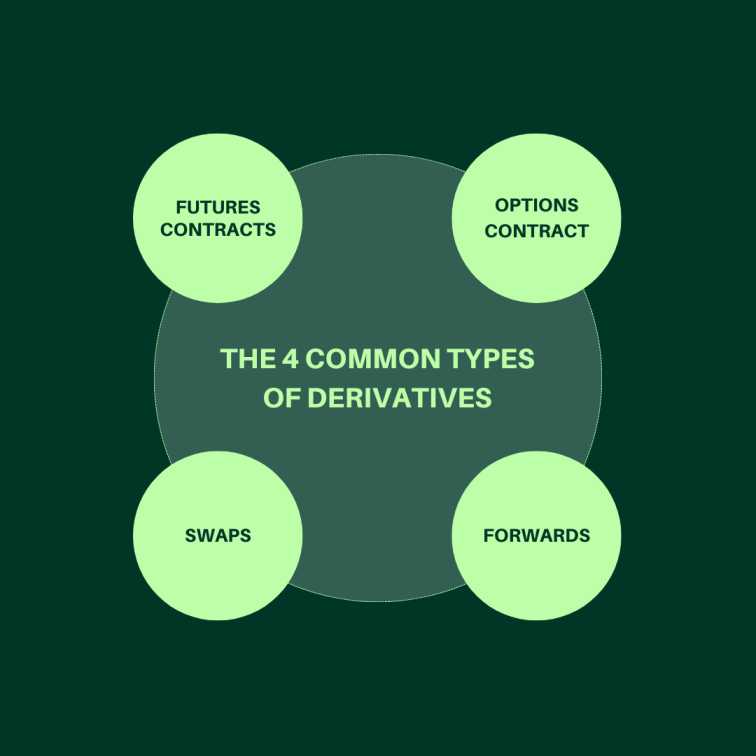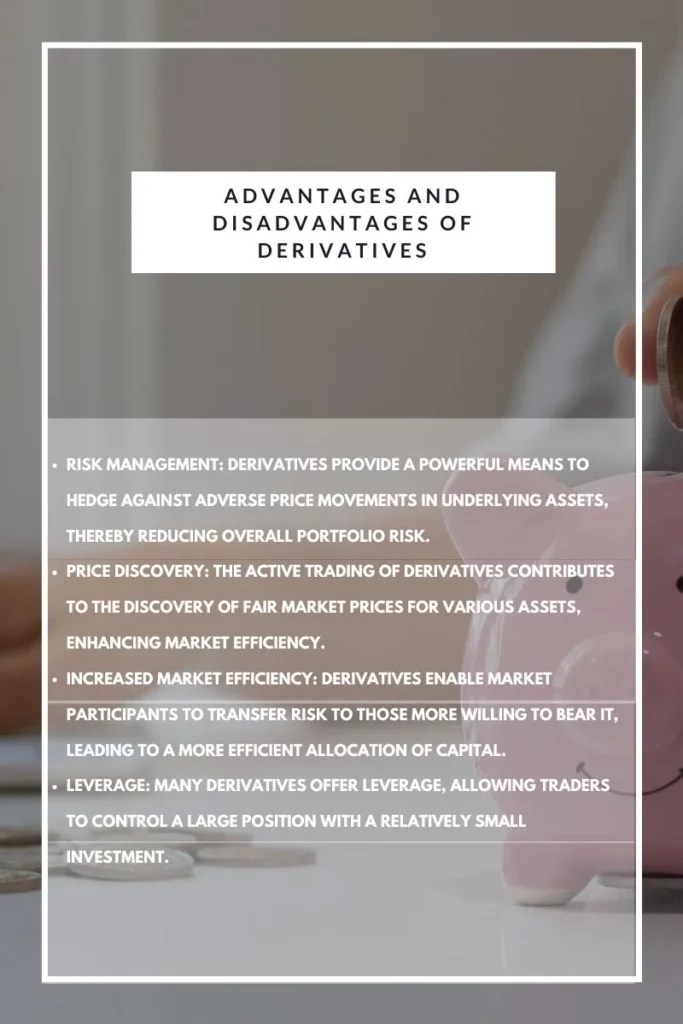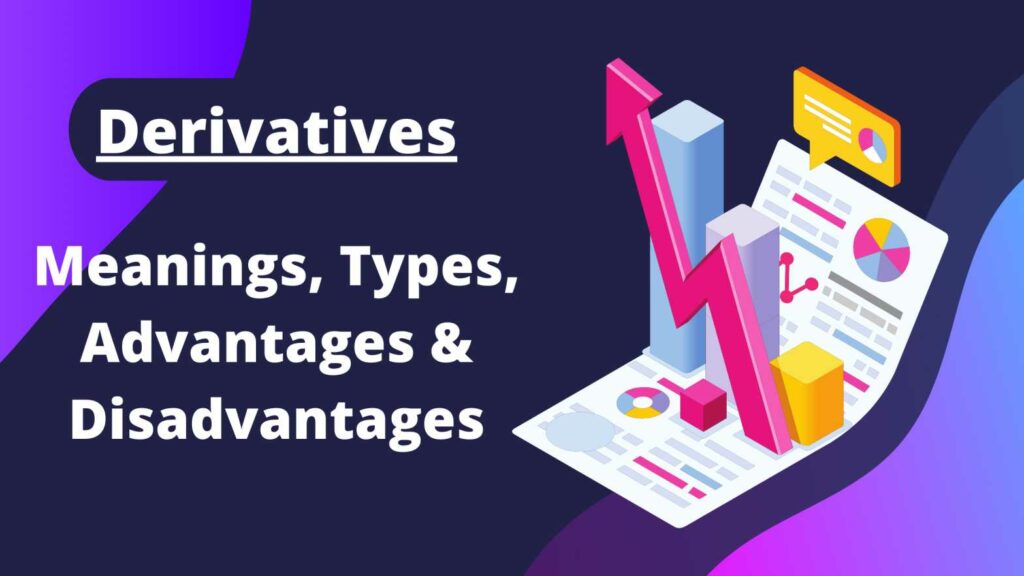Last updated on August 17th, 2024 at 06:04 am
In the world of finance, derivatives stand out as versatile and powerful tools that derive their value from underlying assets. These financial instruments have become integral to modern markets, offering a wide array of applications for investors, traders, and businesses.
So, what is a derivative? We will explore exactly that in this article. It is essential for any finance and investment banking professional to be aware of financial derivatives meaning so that we can offer advisory services.
Derivatives are financial instruments whose value is derived from an underlying asset, like stocks, bonds, commodities, currencies, interest rates, or market indexes. They act as contracts between two or more parties, agreeing to buy or sell the underlying asset at a predetermined price on a future date. Derivatives play a crucial role in risk management and investment strategies.
Whether you’re a seasoned financial professional or a curious beginner, understanding the nuances of derivatives is essential for navigating today’s complex economic landscape. In this article, we will cover what is a derivative in detail. We will find out the financial derivatives meaning and learn about the different types of derivatives out there.
What is a Derivative?
What is a derivative? At its core, a derivative is a financial contract between two or more parties. The value of this contract is linked to, or derived from an underlying asset, such as stocks, bonds, commodities (like gold or oil), currencies, interest rates, or even market indexes.
The contract specifies certain conditions, including the price at which the underlying asset will be bought or sold, the quantity involved, and the date of the transaction. Essentially, the concept of derivatives allows participants to speculate on or manage risks associated with the future price movements of the underlying asset. Let us learn all the essential details about these financial instruments such as what is derivative in trading.
The Underlying Assets of Derivatives
Now that we are aware of what is a derivative, let us learn about the assets behind these financial derivatives. Financial derivatives can be based on a wide variety of underlying assets. Some of the most common include:
- Stocks: Derivatives based on individual company stocks or stock indices.
- Bonds: Derivatives linked to government or corporate bonds.
- Commodities: Derivatives tied to commodities like gold, oil, agricultural products, or industrial metals.
- Currencies: Derivatives based on exchange rates between different currencies.
- Interest rates: Derivatives that track changes in interest rates.
- Market indexes: Derivatives that reflect the performance of broad market indices like the S&P 500 (for the U.S.) or Nifty 500.
Derivative Meaning in Stock Market: Opportunities
A lot of investors ask the question ‘What is a derivative?’ due to being aware of these financial instruments but not being informed of their purpose. Let us discuss the financial derivatives meaning in the stock market and the opportunities that surround these instruments.
In the stock market, derivatives play a multifaceted role, offering investors a variety of strategies to manage risk and capitalise on market movements. One of the primary applications of derivatives is hedging. Investors can use derivatives to protect their portfolios from potential losses due to adverse price movements. For example, a portfolio manager holding a large position in a particular stock might purchase put options on that stock. If the stock price declines, the put options will increase in value, offsetting the losses in the stock portfolio.
Financial derivatives also provide a platform for speculation. Traders and investors who anticipate future price changes in an underlying asset can use derivatives to profit from those changes. For instance, if a trader believes that the price of gold will rise, they can purchase a gold futures contract. If their prediction is accurate, they can sell the contract at a higher price in the future, pocketing the difference as profit.
Arbitrage is another strategy that revolves around derivatives. Arbitrageurs identify price discrepancies for the same asset across different markets and use derivatives to exploit those differences for profit. This involves simultaneously buying the asset in one market and selling it in another, capturing the price difference as risk-free profit. We will also learn about derivative meaning in share market in the later sections.
The 4 Common Types of Derivatives

We now know what is a derivative so let us discuss the 4 common types of derivatives. The world of derivatives offers a diverse range of instruments, each with its own characteristics and applications. Let’s delve into the most common types:
- Futures contracts: These are standardised contracts that are traded on exchanges. Futures obligate the buyer to purchase the underlying asset at a specified price on a future date. These contracts are commonly used for hedging and speculation.
- Options contracts: Options provide the rights and not the obligation, to buy (call option) or sell (put option) underlying assets at a certain price within a specific time frame. Options are widely used for speculation, hedging and generating income.
- Swaps: A swap involves the exchange of a liability or cash flow between two parties based on different financial instruments. Common types of swaps include currency, interest rate and commodity swaps.
- Forwards: Similar to futures, forwards are contracts for buying or selling an asset at a future date. However, forwards are customised agreements and are not traded on exchanges.
What is Derivative in Trading?
Derivative trading refers to the buying and selling of derivative contracts in financial markets. Traders engage in this activity with various motives, including:
- Hedging: Reducing the risk of existing investments by taking offsetting positions in derivatives.
- Speculation: Attempting to profit from anticipated price movements in the underlying asset.
- Arbitrage: Exploiting price discrepancies across different markets.
Traders employ a range of strategies in derivative trading, each tailored to their risk tolerance and market outlook.
Financial Derivatives: A Global Impact
Financial derivatives have a profound impact on the global financial system. They are used by a wide range of participants, including:
- Institutional investors: Hedge funds, pension funds, and mutual funds utilise derivatives to manage their vast portfolios, hedge against risks, and seek higher returns.
- Corporations: Businesses across industries employ derivatives to manage risks associated with interest rates, exchange rates, and commodity prices. This allows them to focus on their core operations while mitigating financial uncertainties.
- Individual investors: Some individual investors venture into derivative markets to speculate on market trends or protect their personal investments. However, due to the complexity and risks involved, derivative trading requires a thorough understanding of the underlying markets and instruments.
Derivatives Meaning in Share Market: Strategies for Success
In the context of the share market, derivatives offer investors unique opportunities and strategies. For example, a trader who believes a particular stock is undervalued might purchase call options on that stock. If the stock price rises, the value of the call options will increase, allowing the trader to profit from the price difference.
Conversely, if an investor is concerned about a potential decline in the stock market, they can buy put options on a stock index. If the market does indeed fall, the put options will gain value, offsetting losses in the investor’s stock portfolio.
It’s important to note that while derivatives offer significant potential for profit, they also come with inherent risks. The leverage embedded in many derivative contracts can magnify both gains and losses. Therefore, it’s crucial for investors and traders to thoroughly understand the risks involved before venturing into the derivatives market.
If you wish to master financial instruments and investment protocols, Imarticus Learning’s Certified Investment Banking Operations Professional program will definitely help you out. This investment banking course provides a solid foundation for a successful career in this dynamic field.
Advantages and Disadvantages of Derivatives: An Honest Perspective
Financial derivatives offer a multitude of advantages, making them valuable tools in the financial world:
- Risk Management: Derivatives provide a powerful means to hedge against adverse price movements in underlying assets, thereby reducing overall portfolio risk.
- Price Discovery: The active trading of derivatives contributes to the discovery of fair market prices for various assets, enhancing market efficiency.
- Increased Market Efficiency: Derivatives enable market participants to transfer risk to those more willing to bear it, leading to a more efficient allocation of capital.
- Leverage: Many derivatives offer leverage, allowing traders to control a large position with a relatively small investment.
However, derivatives are not without their drawbacks:
- Complexity: Derivatives can be complex instruments, and their pricing and behavior can be challenging to understand fully.
- Counterparty Risk: There is a risk that the other party in a derivative contract may not fulfill its obligations.
- Market Volatility: Derivatives markets can be highly volatile, and sudden price swings can lead to substantial losses.
Other Aspects Related to the Concept of Derivatives
Now that we have covered what is derivatives and its types, it is important to explore some other aspects of these financial instruments. Let us discuss some other core concept of derivatives.
Leverage and Margin
One of the most attractive features of derivatives is their leverage potential. Leverage allows traders to control a large position in the underlying asset with a relatively small upfront investment. This is achieved by using a margin, which is a deposit required to initiate a derivative contract. While leverage can amplify gains, it also magnifies losses, making it a double-edged sword.
Pricing Derivatives
The pricing of derivatives is a complex process that involves various factors, including the current price of the underlying asset, the time remaining until expiration, the volatility of the underlying asset, and prevailing interest rates. Mathematical models, such as the Black-Scholes model for options, are often used to calculate theoretical prices.
Risk Management with Derivatives
Derivatives are invaluable tools for managing risk in financial markets. Hedging strategies, such as buying put options to protect against stock price declines or using interest rate swaps to manage interest rate risk, can significantly reduce a portfolio’s vulnerability to adverse market movements.
Speculation and Trading Strategies
Derivatives also offer ample opportunities for speculation. Traders use a variety of strategies, such as buying call options to bet on rising stock prices or selling put options to profit from stagnant or declining markets. These strategies, while potentially lucrative, also carry significant risks and require a deep understanding of market dynamics.
Real-World Applications of Derivatives
Derivatives are not just theoretical constructs; they have practical applications in various industries and financial sectors:
- Agriculture: Farmers use agricultural futures contracts to lock in prices for their crops, protecting themselves from price fluctuations at harvest time.
- Energy: Oil and gas companies use energy derivatives to hedge against price volatility in the energy markets.
- Banking: Banks utilise interest rate derivatives to manage their interest rate risk exposure.
- Investment Management: Portfolio managers use derivatives to hedge their portfolios, generate income, and implement complex investment strategies.

Wrapping Up
Derivatives are complex yet powerful financial instruments that have revolutionised the way we manage risk and invest in financial markets. Their diverse applications and potential for both profit and loss make them an intriguing and challenging area of study. As you delve deeper into the world of derivatives, remember that knowledge and prudence are your best allies.
For aspiring finance professionals, a deep understanding of derivatives is becoming increasingly important. Imarticus Learning’s Certified Investment Banking Operations Professional program offers a comprehensive curriculum that covers all aspects of financial instruments such as derivatives, providing a solid foundation for a successful career in this dynamic field.
FAQ’s
Derivatives trading involves risks such as counterparty risk, market volatility, and the potential for significant losses due to leverage. It’s crucial to have a thorough understanding of these risks before engaging in derivatives trading.
No, derivatives are not suitable for all investors. They are complex instruments that require a good understanding of financial markets and risk management. It’s advisable to consult with a financial advisor before investing in derivatives.
Derivatives markets are regulated by various government agencies and self-regulatory organisations. These regulations are designed to protect investors and ensure the integrity of the markets.
Yes, derivatives can be used for various purposes, including price discovery, income generation, and facilitating arbitrage. They are versatile instruments with a wide range of applications in the financial world.

